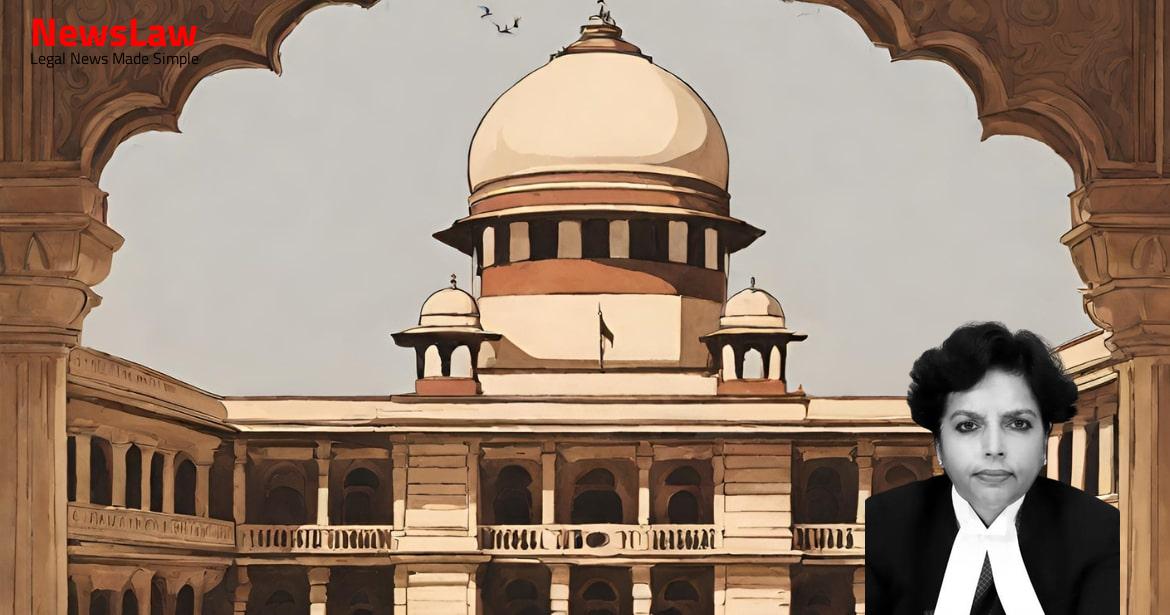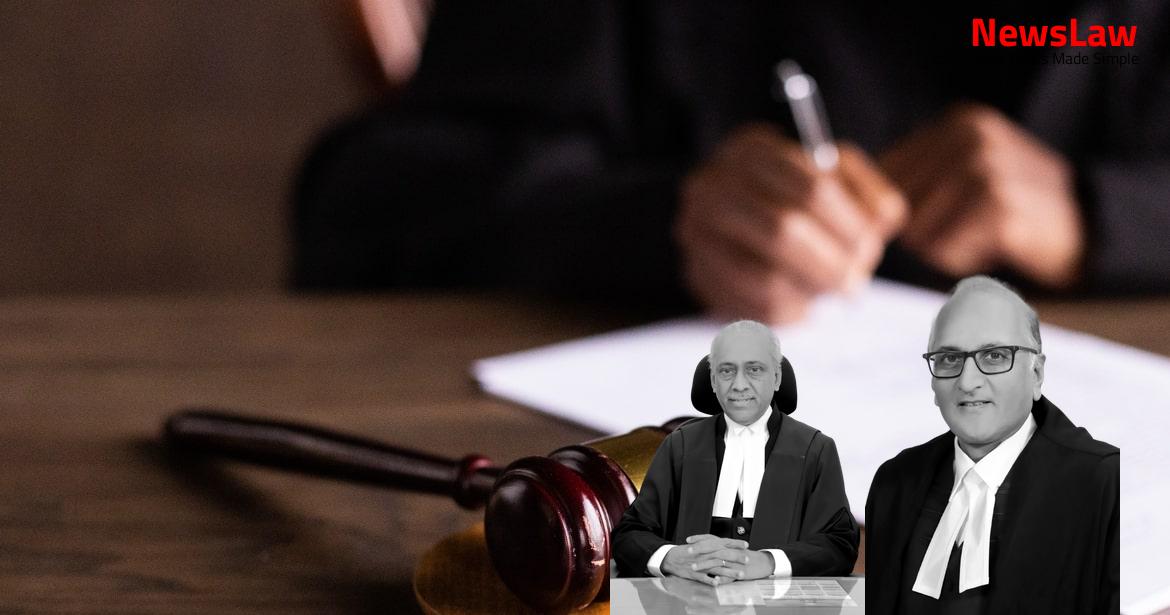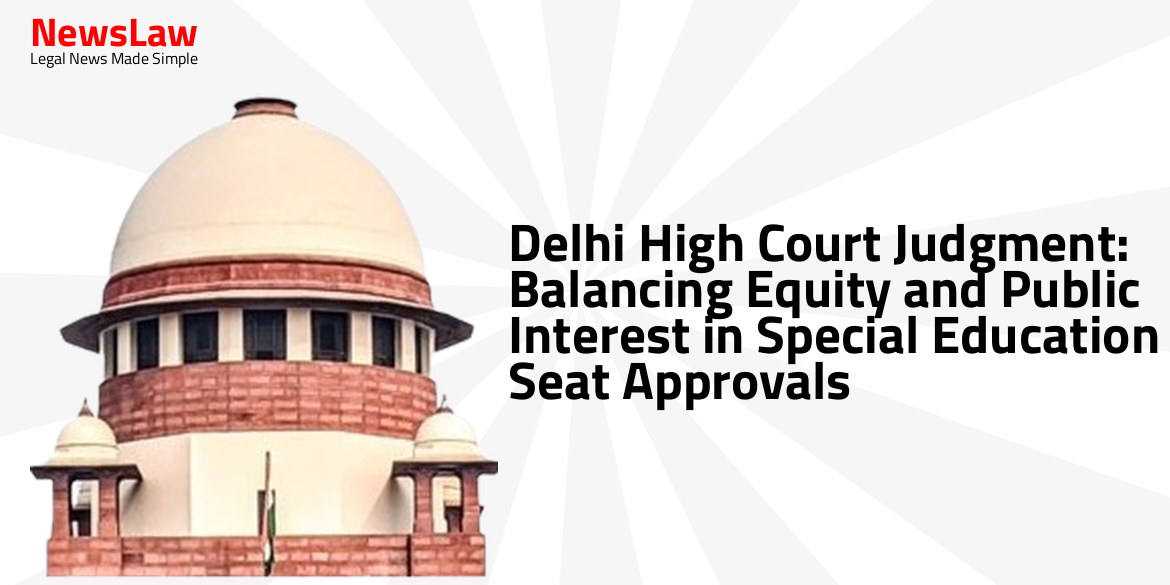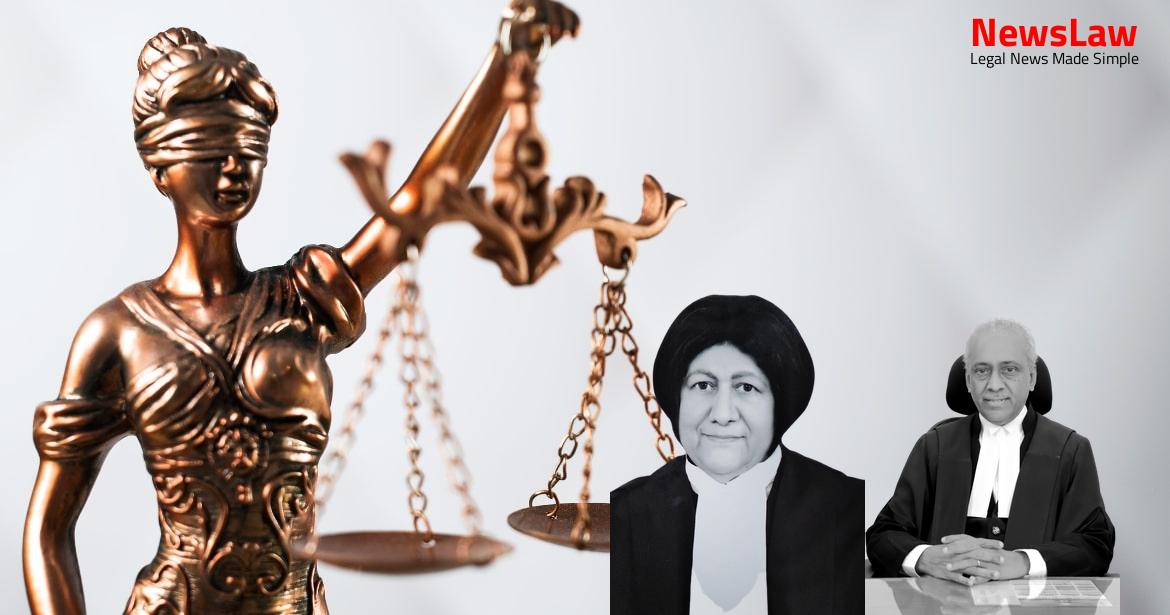Feeling aggrieved and dissatisfied with the impugned judgment and order dated 1.9.2021 passed by the High Court of Karnataka at Bengaluru in Writ Petition No 50799/2019, by which the High Court has allowed the said writ petition and while quashing and setting aside the order passed by the learned Additional City Civil and Sessions Judge, Bengaluru, has permitted the respondents – original writ petitioners to adduce evidence in an application under Section 34 of the Arbitration & Conciliation Act, 1996 (hereinafter referred to as the ‘Act’), the original respondent before the High Court and in whose favour the award has been passed by the learned Arbitral Tribunal has preferred the present appeal. 1
The Court dealing with interim application being IA
No 4 in section 34 application rejected the said interim application and refused to permit the respondents to adduce evidence by observing that if such a permission is granted, it would defeat the object and purpose of early disposal of arbitration proceedings and it would delay further hearing of section 34 application. Therefore, the Court dealing with section 34 application opined that the said amendment intended to limit the scope of judicial review under Section 34 of the Act only in exceptional circumstances enumerated under Section 34(2)(a) of the Act on the basis of the record available and even if the grounds urged relate to section 34(2)(b) of the Act, the applicants cannot have a right to produce additional evidence. The impugned judgment and order passed by the High Court permitting him respondents to adduce evidence/additional evidence in the proceedings under Section 34 of the Act is the subject matter of present appeal before this Court. It is submitted that the impugned judgment and order passed by the High Court permitting the respondents to adduce additional evidence in an application under section 34 of the Act is against the object and purpose of the amending section 34(2)(a), amended vide Act No 33/2019. It is submitted that therefore according to him the provisions of section 34(2)(a) post amendment shall be applicable by which in the proceedings under section 34 of the Act, the applicant is not required to furnish proof on the grounds set out in section 34 (2)(a) to set aside the award and the court dealing with section 34 application has to decide the same only on exceptional circumstances enumerated under section 34(2)(a) of the Act on the basis of the record available.
3
Also Read: https://newslaw.in/case-type/civil/acquisition-of-land-and-deemed-lapse-under-the-act-2013/
It is further submitted that even otherwise and assuming that the provisions applicable prior to amendment (Act 33 of 2019) are applicable, in that case also, as the respondents – original applicants have assailed the award on the grounds enumerated under section 34(2) (b) of the Act, the expression “furnish proof” in section 34(2)(a) cannot apply to section 34(2)(b). Girdhar Sondhi, reported in (2018) 9 SCC 49, this Court has explained the decision in the case of Fiza Developers (supra) and has expressly held that only section 34(2) (a) contemplates furnishing proof. It is submitted that this Court in the aforesaid decision in paragraphs 39 & 40 held that grounds under unamended section 48 including conflict with public policy in section 48(2) are to be established only on basis of “record of arbitral tribunal” in the interest of speedy enforcement of foreign award. Therefore, the award cannot be said to be in conflict with “public policy of Indian law.” 8 It is submitted that the respondents’ contention that the award is frustrated because corporation refused permission for clubbing of khatas which is the basis for award to be executed does not fall within the conflict with public policy ground under section 34(2)(b) because it is the award and not its execution that must conflict with the public policy of India. 9
It is further urged by the learned senior counsel appearing on behalf of the appellant that if this Court is inclined to allow the respondents to lead evidence, in that case, (a) the appellant may be permitted to lead evidence including the permission for clubbing khatas where there are nalas and the corporation’s later endorsement dated 28.6.2004 agreeing to consider clubbing of khatas concealed by the respondents, and (b) the questions of law regarding whether the corporation’s refusal falls under section 34(2)(b) may kindly be left open. It is submitted that in the present case initially the respondents challenged the arbitration proceedings/constitution of the arbitral tribunal and therefore did not participate in the arbitration proceedings. It is submitted that therefore the respondents made an application to produce the evidence in section 34 application to produce the final endorsement dated 17.03.2003 by which the prayer for amalgamation of khatas to plots were rejected and thereafter it is required to examine the concerned officer. It is submitted that as such the words “ furnish proof” shall be applicable with respect to an application to set aside the award on the grounds set out in section 34(2)(a) & 34(2)(b) and not section 34(2)(a) alone, as sought to be contended on behalf of the appellant. Apart from the fact that it was conceded by the learned counsel appearing on behalf of the appellant before the High Court that the law prevailing prior to the amendment of Section 34(2)(a) by Act 33/2019 shall be applicable, even otherwise, we are of the opinion that the arbitration proceedings commenced and even the award was declared prior to the amendment of Section 34(2)(a) by Act 33/2019, Section 34(2)(a) pre-amendment shall be applicable.
Prior to the amendment of section 34(2)(a), an arbitral award could be set aside by the Court if the party making an application “furnishes proof” and the grounds set out in section 34(2)(a) and section 34(2)(b) are satisfied. The scheme and provisions of the Act disclose two significant aspects relating to courts vis–vis arbitration. The scope of enquiry in a proceeding under Section 34 is restricted to consideration whether any one of the grounds mentioned in sub-section (2) of Section 34 exists for setting aside the award. Pursuant to this policy, Section 34 imposes certain restrictions on the right of the court to set aside an arbitral award. In other words, an arbitral award can be set aside only if one or more of these seven grounds exists. Therefore, the only question that arises in an application under Section 34 of the Act is whether the award requires to be set aside on any of the specified grounds in sub-section (2) thereof. Even if the applicant does not rely upon the grounds under clause ( b ), the court, on its own initiative, may examine the award to find out whether it is liable to be set aside on either of the two grounds mentioned in Section 34(2)( b ).
Applications under Section 34 of the Act are summary proceedings with provision for objections by the respondent-defendant, followed by an opportunity to the applicant to “prove” the existence of any ground under Section 34(2). SBEC Systems, 2004 SCC OnLine Del 863 :
AIR 2005 Del 95], cited by us hereinabove, correctly reflect the position in law as to furnishing proof under Section 34(2)( a ). , (2009) 17 SCC 796 : (2011) 2 SCC (Civ) 637] was a step in the right direction as its ultimate ratio is that issues need not be struck at the stage of hearing a Section 34 application, which is a summary procedure.
Also Read: https://newslaw.in/case-type/civil/taxation-of-engineering-design-drawings-goods-or-services/
After taking note of the observations made in paragraph 21 in Emkay Global (supra), thereafter it is observed by this Court in the case of Canara Nidhi (supra) that the legal position is thus clarified that section 34 application will not ordinarily require anything beyond the record that was before the arbitration and that cross-examination of persons swearing in to the affidavits should not be allowed unless absolutely necessary. The ratio of the aforesaid three decisions on the scope and ambit of section 34(2)(a) pre-amendment would be that applications under sections 34 of the Act are summary proceedings; an award can be set aside only on the grounds set out in section 34(2)(a) and section 34(2) (b); speedy resolution of the arbitral disputes has been the reason for enactment of 1996 Act and continues to be a reason for adding amendments to the said Act to strengthen the aforesaid object; therefore in the proceedings under section 34 of the Arbitration Act, the issues are not required to be framed, otherwise if the issues are to be framed and oral evidence is taken in a summary proceedings, the said object will be defeated; an application for setting aside the arbitral award will not ordinarily require anything beyond the record that was before the arbitrator, however, if there are matters not containing such records and the relevant determination to the issues arising under section 34(2)(a), they may be brought to the notice of the Court by way of affidavits filed by both the parties’ the cross-examination of the persons swearing in to the affidavits should not be allowed unless absolutely necessary as the truth will emerge on the reading of the affidavits filed by both Now so far as the submission on behalf of the appellant that the requirement of “furnishing proof” as per pre-amendment of section 34(2) (a) of the Arbitration Act shall not be applicable to the application for setting aside the award on the grounds set out in section 34(2)(b) and the submission that in the execution proceedings the subsequent development of refusing to grant permission for amalgamation of the plots can be considered and it will be open for the applicants to point out in the execution proceedings that the award is not capable of being executed is concerned, at the outset, it is required to be noted that even for establishing that the arbitral award is in conflict with Public Policy of India, in a given case, the evidence may have to be led and by leading evidence, the person who is challenging the award on that ground can establish and prove that the arbitral award is in conflict with Public Policy of India and/or the subject matter of dispute is not capable of settlement by arbitration under the law for the time being in force.
Case Title: M/S ALPINE HOUSING DEVELOPMENT CORPORATION PRIVATE LIMITED Vs. ASHOK S DHARIWAL (2023 INSC 57)
Case Number: C.A. No.-000073-000073 / 2023



